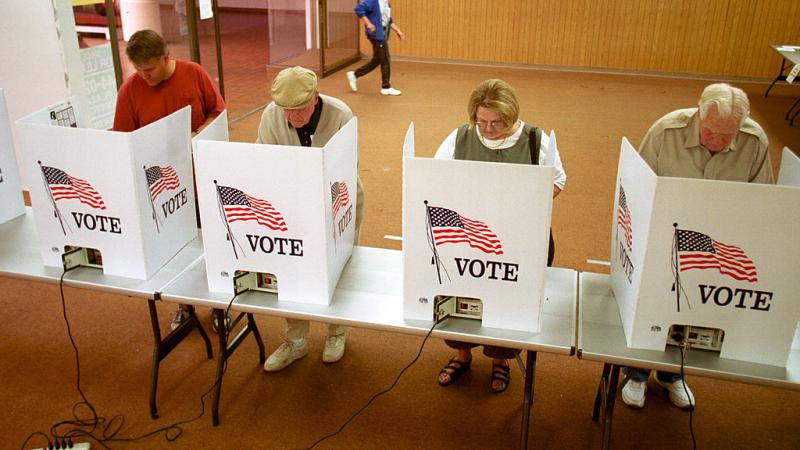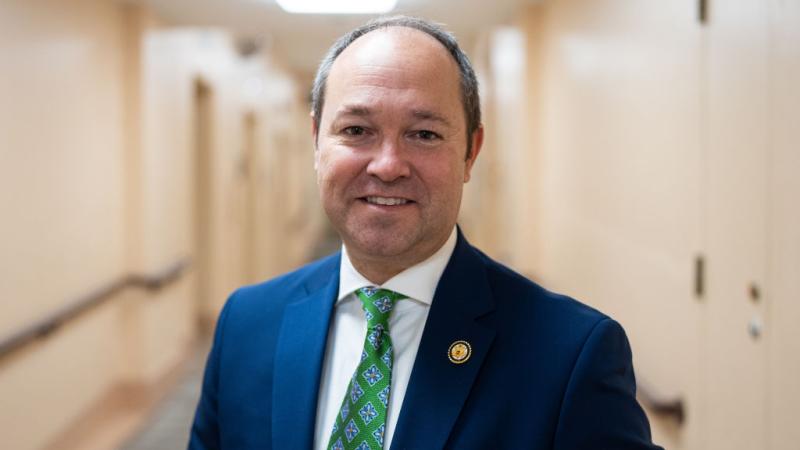Johnson: Two-step CR allows more time to cut spending, 'done' with short-term funding bills
Johnson says government would have to borrow $1.5 trillion to cover federal spending over next two quarters under current trajectory.
House Speaker Mike Johnson assured his colleagues and the general public that his two-step Continuing Resolution (CR) will allow the House GOP more time to reach a consensus on federal spending cuts, declaring that he will not pursue anymore short-term funding bills.
Still, conservatives like Rep. Matt Rosendale, R-Mont., voted against the CR. It ultimately passed in a bipartisan vote on Tuesday evening.
"Our country is facing $33 trillion of debt. Something has to change," Rosendale wrote Tuesday on the social media platform X. "The American people are tired of hearing that Republicans are going to fight...tomorrow. I'm a NO on the CR!"
Johnson warned the U.S. government would have to borrow $1.5 trillion to cover federal spending over the next two quarters under the current trajectory.
"We are on an unsustainable track with our debt. There's no two ways about it," Johnson said Tuesday on Capitol Hill.
The annual interest on the U.S. national debt has hit $1 trillion. The national debt is nearly $34 trillion.
"I want to cut spending right now, and I would like to put policy riders on this, but when we have a three-vote majority, as we do right now, we don't have the votes to be able to advance this right now," he said.
"Look, it took decades to get into this mess, right? I've been at the job less than three weeks, right? I can't change – I can't turn an aircraft carrier overnight," he added. "But this was a very important first step to get us to the next stage so that we can change how Washington works."
According to House Majority Leader Steve Scalise, H.R. 6363, the Further Continuing Appropriations and Other Extensions Act, 2024, "provides further continuing FY24 appropriations to federal agencies that fall under the Military Construction and Veterans Affairs, Transportation and Housing and Urban Development, Agriculture, and Energy and Water appropriations bills through January 19, 2024, and remaining agencies through February 2, 2024."
Scalise's office said that the resolution "allows sufficient time to pass the remaining funding" and separates "supplemental funding debates," such as additional foreign aid for Ukraine and Israel.
Johnson said the two-step process avoided passage of a large-scale omnibus spending bill like the 4,155-page $1.7 trillion spending bill that Congress passed last December.
"This allows us as conservatives to go into the fight on the next stages of this, to talk about real border changes, policies at the border, to close the southern border, to get it under control, to talk about the oversight that's necessary on additional Ukraine aid; to get Israel done if they don't do it, as we've begged them to do," he said.
"All these other matters in the supplemental, that puts us in the policy discussion. And we'll have stringent fights on principle and philosophy and cuts as well," he added.
Despite his assurances, Johnson was unable to gain the support of members of the conservative House Freedom Caucus, who voted against the CR on the House floor.
Enough Democrats voted for the CR to bring it over the finish line.
"Once again the Republican majority needs Democratic votes to govern," said House Appropriations member Rosa DeLauro, D-Conn., on the House floor ahead of the vote.
Johnson promised not to pursue anymore short-term CRs.
"The House Republican Conference is committed to never being in this situation again. I'm done with short-term CRs," he said. "We're going to get the appropriations process running on time as it's supposed to be under law."
Johnson said passage of the two-step CR allows members to go home for Thanksgiving and "cool off" before returning to Capitol Hill.
"Members have been here for as Leader Scalise said, for 10 weeks. This place is a pressure cooker," he said. "And so I think everybody can go home, we can come back, reset, we're going to get our group together. We're going to map out that plan to fight for those principles."
Some Democrats were initially critical of Johnson's two-step approach but most of the Democratic caucus wound up supporting the bill.














